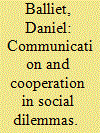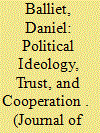| Srl | Item |
| 1 |
ID:
093682


|
|
|
|
|
| Publication |
2010.
|
| Summary/Abstract |
Among the most researched solutions to social dilemmas is communication. Since the late 1950s, it has been well known that communication enhances cooperation in social dilemmas. This article reports a meta-analysis of this literature (forty-five effect sizes) and finds a large positive effect of communication on cooperation in social dilemmas (d = 1.01). This effect is moderated by the type of communication, with a stronger effect of face-to-face discussion ( d = 1.21) compared to written messages (d = 0.46). The communication-cooperation relationship is also stronger in larger, compared to smaller, group social dilemmas. Whether communication occurred before or during iterated dilemmas did not statistically affect the communication-cooperation effect size. Results are discussed according to theory and research on communication in social dilemmas.
|
|
|
|
|
|
|
|
|
|
|
|
|
|
|
|
| 2 |
ID:
159250


|
|
|
|
|
| Summary/Abstract |
Theories suggest that political ideology relates to cooperation, with conservatives being more likely to pursue selfish outcomes, and liberals more likely to pursue egalitarian outcomes. In study 1, we examine how political ideology and political party affiliation (Republican vs. Democrat) predict cooperation with a partner who self-identifies as Republican or Democrat in two samples before (n = 362) and after (n = 366) the 2012 US presidential election. Liberals show slightly more concern for their partners’ outcomes compared to conservatives (study 1), and in study 2 this relation is supported by a meta-analysis (r = .15). However, in study 1, political ideology did not relate to cooperation in general. Both Republicans and Democrats extend more cooperation to their in-group relative to the out-group, and this is explained by expectations of cooperation from in-group versus out-group members. We discuss the relation between political ideology and cooperation within and between groups.
|
|
|
|
|
|
|
|
|
|
|
|
|
|
|
|